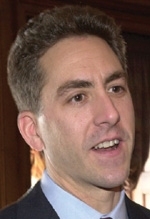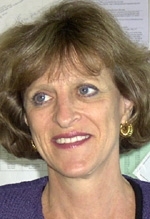The five MacVicar Faculty Fellows for 2003 share with their predecessors a passion for innovative pedagogy, a love of learning and a devotion to their students that is reciprocated with enthusiasm.
This was apparent both in the Fellows' own remarks on Friday at the MacVicar Day luncheon in the Faculty Club--at which Provost Robert A. Brown announced their appointments, and in the written observations their students provided during the nomination process. Dean for Undergraduate Education Robert P. Redwine heads the committee of faculty and students who choose the Fellows.
Margaret MacVicar, who died in 1991 at age 47, exemplified passion for teaching during her MIT career. She founded UROP (the Undergraduate Research Opportunities Program) and played a key role in rethinking and reshaping the undergraduate program.
The fellowships were established in 1992 to honor the life and contributions of MacVicar (S.B. 1964, Sc.D.), who was MIT's first dean for undergraduate education. Her mother, two sisters and a family friend attended Friday's ceremony.
Professor Jesus A. del Alamo of electrical engineering and computer science, who never met MacVicar, could have been speaking for all of the Fellows on Friday when he said, "I am in awe of her immense legacy to undergraduate education at MIT and beyond. When I joined MIT as a faculty member [in 1988] and learned about the UROP program, I thought this was the greatest innovation in undergraduate education that I ever saw."
Noting that UROP student Lane Brooks developed the first working prototype of WebLab in his laboratory in 1998, del Alamo said, "I love MIT's commitment to undergraduate research, to undergraduate teaching, to educational innovation. I love MIT's can-do attitude and optimism. I love MIT's focus on leadership and education."
In a nominating letter, a former student with a penchant for skipping classes recalled attending del Alamo's lectures regularly, but wondered why he kept returning. "Now I think I understand," wrote the student, who remains anonymous. "True, one can learn the story of Puccini's 'Turandot' by reading the libretto. But just as watching an opera is orders of magnitude better than reading the libretto, so is attending Professor del Alamo's lectures so much more enriching than just reading his notes."
Professor of Music Peter Child developed affection and respect for MIT students when a misunderstanding led several to misinterpret a request to "listen analytically" to Schubert's "Winterreise" song cycle. The students thought the assignment was to analyze the pieces, an unreasonable task for professional musicians to complete in a few days. But it didn't stop the MIT students from trying, a trait that endeared them to Child.
"Teaching at MIT is an opportunity not just to impart knowledge and skill, since the students made that piece easy, but also to try to address the whole person of that student," said Child, who joined the faculty in 1986.
Child's students remembered learning more than musical theory in his classes. Said one, now a teacher himself: "I know that the interactions I have with my students (both within and beyond the classroom) are richer as a result of my engagement with his philosophies and methods."
Students of Professor Ian A. Waitz remembered his approachability, his preference for exchanges as opposed to straight lectures, and his commitment to address every question until the student was satisfied. They also appreciated his sense of humor, particularly when he was the butt of the joke. One student recalled, "One day someone in class switched the concept question up on the board when no one was looking. The question of the day became 'Which movie character does Professor Waitz most resemble?' The overwhelming answer was Egon from "Ghostbusters." His response to this was to break out laughing."
Waitz, who joined the aeronautics and astronautics faculty in 1991, enjoys his students as much as they enjoy him. "I have always loved teaching undergraduates more than any other role I play here, so it is terrific to be recognized this way," said Waitz. He is married to Associate Professor Heidi Nepf of civil and environmental engineering, herself a 2001 MacVicar Fellow.
"It would be easy to say that she inspired me because she is an excellent teacher, which is true," Waitz said of Nepf. "But what inspires me most is the excellence she brings to everything she does ... She encouraged me to think about scholarship in teaching the same way we think about scholarship in research--if you don't know something, start by reading the literature."
Like Waitz, Professor Barbara Imperiali of chemistry and biology is committed to answering students' questions promptly and completely. "She truly cared and tried her best to help her students understand and appreciate organic chemistry," said one student. Another added, "A couple of nights before every exam, she would personally hold a one-hour review session after dinner."
"I am so lucky," said Imperiali, who spoke briefly and extemporaneously. "I get to teach a subject I love which is at the nexus of so much current research, and I get to teach MIT students--a demanding but rewarding group."
One student gave Imperiali the ultimate tribute: "She is truly the best professor I have ever had since coming to MIT."
Professor Isabelle de Courtivron of foreign languages and literatures (FLL), who is on sabbatical in Paris and was unable to attend the luncheon, sent a written message. She noted that she has wondered on many occasions whether she belonged at an institution dedicated to science, engineering and management.
"Each time I have harbored doubts about the value of my contribution to MIT education, I have tried to tell myself that the margins are what keep the pages together," de Courtivron wrote. "But I must say that I sometimes wished I could have been more central to the book. What bolstered and reassured me during these troubled times were several very precious things: the unfailing support of [Dean] Philip Khoury ... the warm companionship of my multilingual, multicultural colleagues in FLL with whom I share a vision of the world and of education; and of course the students it has been my privilege to teach over the years."
In supporting de Courtivron's nomination, one student wrote: "I feel that Professor de Courtivron deserves a MacVicar Fellowship because of her vivacity and love for teaching, as well as for the inspiration I have seen her provide each of her students."
A version of this article appeared in MIT Tech Talk on March 12, 2003.










